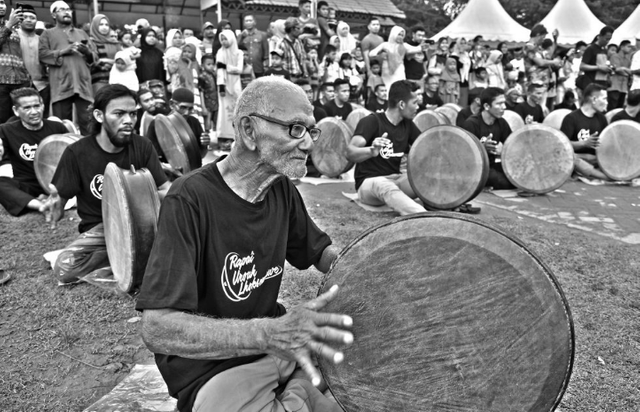Rapa'i, Percussion aceh

Percussion art has existed in the world since the advent of human civilization. during this time percussion became a musical instrument that often accompanied the activities of human tradition.
Various ethnic groups in the world, as well as a variety of different percussion patterns beat.
Almost all ethnic groups in the world have musical instruments, historians argue percussion instruments were the first musical instrument ever invented, after the human voice.
Over time, expertise and technology enable humans to create holes in wood as instruments to produce sounds in longer intonations, such as bedugs or drums.
In some religious and tribal civilizations, percussion becomes a means of communication in worship for its people. Islam, for example, uses it to promote religion to people. So that the instrument became part of Islam and its adherents.
I also believe that Buddhists, especially fanatics, use percussion instruments such as Gong, Hinduism and other religions. Even adherents of animism also use tabuh tools in worship.
This time I want to give information about rapa'i tabuh instrument. It is a round percussion with strings from the skin of cows or goats from Aceh, a tribe that inhabits the westernmost tip of Sumatra Island in the State of Indonesia.
Acehnese people are known for their Muslim majority. In the past, Aceh was the entrance to Islam in Indonesia. Acehnese people love music, and Rapa'i is one of the instruments of tradition that is full of history.
But the history is still a mystery, because some historical sources tell different stories.
Like the Government of Aceh, rapa'i comes from the word bearer of the instrument to Aceh namely Syech Rifa'i. He was a great Baghdad cleric who spread Islam to Aceh in the 11th century.
At that time, Islam entered Aceh through trade routes, because Aceh became one of the two continents' trade transit areas and was located in the Strait of Malacca.
Historical sources from the Government of Aceh also say that rapa'i instruments were first shown to the public in Banda Khalifah in the 11th century. Now the area is called Kampung Pande which is located in Kuta Raja, or Banda Aceh, the capital of Aceh Province.
Another opinion says, Islam entered Aceh since the first century Hijri namely in the 7th or 8th century AD.
There are also those who say Islam entered in the 13th century AD after the establishment of the strongest Islamic kingdom in Southeast Asia at that time, the Kingdom of Samudera Pasai, that's when rapa'i musical instrument began to develop.
Rapai Modern
A Rapai art conservationist from Pasai, Aceh, Nazaruddin, said Rapai consists of Tualang wood material, a type of hardwood that is densely fiber.
Made circular with a long drying process or called Baloh. After that, Baloh is tied with strings of dried goatskin and cows.
Between the circular sides is tucked into a small rotal to create a fitting tension on the strings. Small large rattan adapted to the need for voltage on the strings. The larger the tucked rattan, the tighter the strings.
Unfortunately, nowadays the type of Tualang wood is very rare.
Rapai is beat with the palm of the hand. Usually played in groups or called Kuru. In one kuru consists of 40 drummers, led by a Syech or rhythm guide. In Pasai, Rapai was contested (Uroh). hence in pasai area known as Rapai Uroh. Uniquely, Rapai is only played by males at least in their teens.
In this modern era, many ethnic Acehnese singers combine electric modern musical instruments with Rapai as the percussion side. Thus, the existence of Rapai as a musical instrument of Aceh tradition again squirmed and considered as the process of preserving Rapa'i.
It can be said, the modern Rapai era began to occur in the 2000s, where acehnese ethnic music tradition began to be calmed by Acehnese singers, who collaborated modern instruments with rapai tabuh instruments.
Acehnese singers became famous. For example Rafli with his band "Kande" made rapai as the main element in his songs. Then there is Joel Pase with his band "Cupa Band", singer Subur Dani with Tangke Band and Acun with his group Rapa'i Rawi and Meurandeh Sabang.